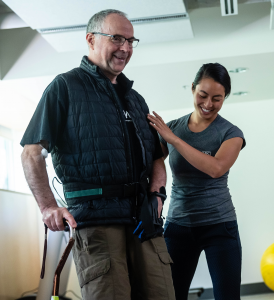FAME for NEUROFITNESS fills the physical therapy gap for people with neurological conditions
 The UBC PTRC, located near the Djavad Mowafaghian Centre for Brain Health, offers support for people with neurological conditions, movement disorders, stroke, and Multiple Sclerosis through group exercise classes which can be tailored for their needs
The UBC PTRC, located near the Djavad Mowafaghian Centre for Brain Health, offers support for people with neurological conditions, movement disorders, stroke, and Multiple Sclerosis through group exercise classes which can be tailored for their needs
The program is adapted from Dr. Janice Eng’s Fitness and Mobility Exercise (FAME) program, an evidence-based exercise program that Dr. Eng originally developed for people recovering from stroke. The program is widely successful, and is currently employed for stroke recovery at over 300 sites in 21 different countries. A clinically tested program, FAME has been shown to improve strength, balance, cardiovascular fitness, bone density and reduce falls in people working to regain mobility following neurological injury. The program has been used for a variety of populations, including people with Parkinson’s disease, multiple sclerosis and frail older adults.
The new clinic, run by the UBC Department of Physical Therapy, offers people a unique opportunity to experience the latest in evidence-based physical therapy in a research-focused environment. This innovative clinic is a student-led model where physical therapy students will be providing care in collaboration with a registered physical therapist. This model will enable the program to be competitively priced at $10 per exercise class.
“Through this program, we will evaluate the first FAME for NEUROFITNESS cohort as they go through this program from an implementation perspective,” said Dr. Eng. “This clinic will have a strong research component.”
The twice-weekly program will run for six weeks per session and is designed for adults living in the Metro Vancouver area who can stand for at least five minutes, and who can walk 10 metres (with or without the use of walking aid). Classes will be small, with personalized support from a qualified physical therapist. The insights gained from the initial cohort will inform future programming in terms of fidelity, feasibility and efficacy.
“We hope that this program fills a known gap in services for people with neurological conditions such as Parkinson’s disease, multiple sclerosis or stroke,” said Dr. Eng.
For more information on the program, or to enroll, please contact us.